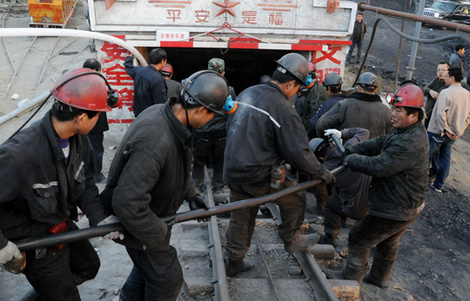|
|||||||||||
BEIJING - Cooperation in the oil and gas sector constitutes a major part of China-Russia economic relations, but it is not everything.
While strengthening their energy cooperation, Chinese and Russian economic managers are now exploring new fields to diversify their economic ties and optimize the trade structure.
That was illustrated by Russian Prime Minister Vladimir Putin's latest visit to Beijing, where he co-chaired with Premier Wen Jiaobao the 16th regular meeting between the two countries' prime ministers. Putin made the visit from Tuesday to Wednesday, which was his first overseas trip since he announced his plan to run for the Russian presidency again.
As always, Putin's visit garnered great attention from the press, largely thanks to an on-going pricing negotiation on natural gas. Russian gas giant Gazprom and China National Petroleum Corporation have signed a framework agreement, under which Russia will deliver 70 billion cubic meters of gas to China annually via two pipelines. However, the agreement has been delayed over pricing disagreements.
"Energy cooperation is an important part of the China-Russia comprehensive strategic cooperative partnership, of strategic, comprehensive and lasting significance," said Vice Premier Wang Qishan on the sidelines of the meeting.
Early this year, an oil pipeline linking Russia's far east and northeast China started operating, which will transport 15 million tonnes of crude oil from Russia to China annually between 2011 to 2030.
Wang said the completion and operation of the Sino-Russian pipeline marked a breakthrough in energy cooperation, opening up a steady market for the import and export of Russian crude oil.
According to Putin, the negotiation on the huge gas supply deal is pressing ahead and reaching the end.
"We are nearing the final stage of work on gas supplies," the Russian Prime Minister told reporters on Tuesday.
"Those who sell always want to sell at a higher price, while those who buy want to buy at a lower price," Putin said, adding that he believes the enterprises "will find a fair and rational solution to that issue."
Putin's remarks were echoed by Chinese scholars. "It is natural that the companies will bargain over the price, and that takes time," said Xing Guangcheng, a fellow researcher with the Chinese Academy of Social Sciences.
Xing said he was sure the two sides will finally reach a compromise and cut a deal as China and Russia are "new-type strategic partners mutually complementary" in the energy sector.
The energy cooperation between Russia and China is not confined to the supply of oil and natural gas, Putin said, adding that the two countries are working together on major exploration and exploitation projects as well.
The two countries are also cooperating in nuclear energy. The China Experimental Fast Reactor that Russia's vice prime minister Igor Sechin visited on the sidelines of Putin's visit, is one of the results of China-Russia cooperation on nuclear energy.
In a communique inked by Wen Jiabao and Putin after their meeting, the two sides pledged to develop their "strategic cooperative relations" in energy on the basis of mutual benefit and deepening cooperation in oil, natural gas, electric power, coal, energy efficiency and conservation, new energy and peaceful use of nuclear energy.
The two prime ministers "spoke highly of the achievements and broad foreground of bilateral energy cooperation," according to the document.
While stressing the significance of energy cooperation, the two countries looked beyond the sector to find more pillars supporting their sustainable economic collaboration.
The readjustment goes with the two nations' domestic strategies for economic development, especially as Russia is seeking to diversify its economy and lessen its reliance on exports of energy and raw materials.
According to Russia's growth strategy to the year 2020, the country is pursuing innovative development that relies on human potential and the effective use of knowledge and individual skills, which is considered by Putin as "the only alternative to dependence on natural resources."
While Russia has blueprinted its strategic development for the next ten years, China is also eyeing the following decade as a key period.
The two countries should take more concrete and practical measures to innovate the means and expand the breadth of cooperation in accordance with their ten-year strategy for the development of the bilateral ties, in order to achieve win-win results in their cooperation, Wen said.
If the two giant neighbors work in sync when carrying out their growth strategy and both give full play to their comparative advantages properly, what will the picture look like?
Given the circumstances, it's logical that the two have set the targets for bilateral trade to reach $100 billion in 2015 and $200 billionin 2020. China is currently Russia's largest trading $70 billion this year.
High technology
During Putin's two-day visit to China, "high technology" was a hot word frequently used by leaders of the countries.
The joint communique specifies some areas of cooperation for the two sides, including nanotechnology, new materials, bioengineering, energy conservation and telecommunication.
They also pledged to "deepen long-term cooperation in aviation and aerospace," according to the communique. Space agencies of both countries have drafted and adopted the follow-up cooperation outline for 2013 and beyond, it said.
China and Russia said they will push forward the establishment of an innovation chain that ranges from joint research to commercialization and industrialization of China-Russia research outputs.
They will also support the free entry of high-tech enterprises to both countries' high-tech parks and create necessary conditions for the cooperation between innovation institutes of both countries.
"Both China and Russia have entered the phase of economic modernization, and they have very extensive room for cooperation in technology," said Xing, the Chinese scholar.
Joint special economic zone
According to the communique, the two countries are also discussing building a special economic zone in Russia.
Jiang Yi, a Russia expert with the Chinese Academy of Social Sciences said that the special economic zone would help the two countries make a breakthourgh in investing into each other.
"Cooperation in capital, logistics, and energy could be boosted in the zone, "Jiang said, adding that the planned zone will tighten the two sides' economic and trade relations as well.
Related Stories
China, Russia to expand trade, energy co-op 2011-10-12 18:59
China, Russia pledge closer cooperation 2011-10-12 17:10
Russia, China working on new energy routes:Putin 2011-10-12 01:13
China, Russia vow to deepen co-op in humanities 2011-10-11 14:29
China raises proposal on economic co-op with Russia 2011-10-11 06:23
Putin's visit to enhance China-Russia cooperation 2011-10-10 09:32
Hot Topics
Libya conflict, Gaddafi, Oil spill, Palace Museum scandal, Inflation, Japan's new PM, Trapped miners, Mooncake tax, Weekly photos, Hurricane Irene
Editor's Picks

|

|

|

|

|

|






